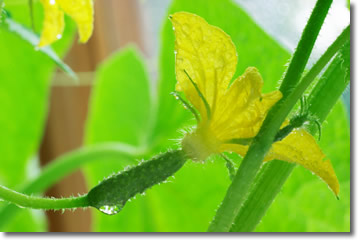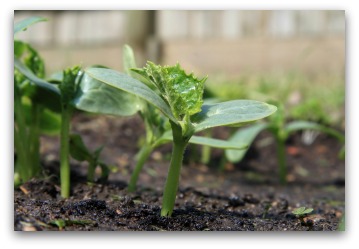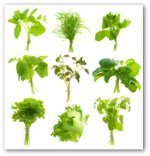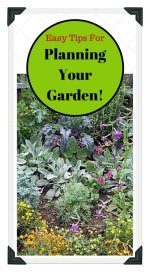Grow Cucumbers in Containers and Your Garden
Learn how to grow cucumbers in a backyard vegetable garden or in a container garden.
We offer easy tips for planting cucumber from seeds or transplants, and the best methods of growing cucumbers using a cage or trellis for support.
Design Your Own Vegetable Garden Layout Using our Free "Vegetable Garden Planner" Software!
When to Plant Cucumbers
Cucumber seeds or transplants should not be planted outdoors in the garden or in containers until all danger of frost is past.
If an unexpected frost arrives after your cucumber plants are in the garden, cover them with an overturned bucket or other container to protect the plants from frost damage.
Don't cover them with plastic sheeting, as the cold will transfer through the plastic onto the plants.
Fabric works well to protect plants; just be sure it isn't plastic.
Growing Cucumbers from Transplants
Download Free Garden Planning Worksheets, Garden Diary, Zone Chart, Or Planting Guide
Using a spade or garden knife, make a slit in the ground cutting through the plastic.
I usually cut an "X" with my knife, as it makes a larger hole that is easier to work with.
Cut the plastic and push the edges of the plastic into the slit.
Gently peel back the top of the peat pot that holds the seedling below the soil line.
Plant the pot directly in the soil under the plastic mulch.
For rapid growth, water the transplants with a mixture of water and foliar fertilizer.
Grow Cucumbers Using a Trellis
A good way to grow cucumbers and save vegetable gardening space is to train cucumbers up a cage, trellis or fence.
Set the cucumber plants out at two to three feet spacing between plants.
Add a wire cage, or wooden trellis near or over each cucumber plant.
If needed, train some of the first vines onto the trellis. Usually the cucumber plant will find the trellis on its own, as they like to climb!
The trellis will help you be able to see your cucumbers more easily, as they like to hide and grow under the leaves!
Growing cucumbers on a trellis also help shade the plant-roots during hot weather.
Cucumber Plants Love Compost
 Cucumber Harvest
Cucumber HarvestWe notices this when we found "volunteer" cucumbers growing near our compost pile.
They sprouted from over-grown cucumbers that had been added to the compost pile.
If you decide in July to plant a second cop of Burpless Hybrid or another favorite variety, try to grow cucumbers from seeds planted at the base of the compost pile.
Depending on growing conditions and your local frost dates, you could grow cucumbers through September and October using this method.
Favorite Cucumber Varieties
Typically most gardeners change their gardens a little each year, add a plant here, take away a planting there.
We hope you do the same to spice up your plantings.
To give you some idea of favorite varieties we have listed a few that are suitable throughout the country as a guideline.
The main requirements when purchasing seeds is that the plants suit your soil, family's taste, and local weather conditions. Favorites include: Sweet Slice, Victory Hybrid, Burpless Hybrid, and for pickling BravoHybrid.
How to Grow Cucumbers in Containers
Suggested cucumber varieties for container gardens:
* Salad Bush Hybrid
* Bush Champion
* Picklebush
* Spacemaster
* Hybrid Bush Crop
* Midget Bush Pickler
If ground space is unavailable, container grown vegetables have quite a bit to offer the vegetable gardener in the way of fresh grown produce.
The benefits include portability, attractiveness, and low maintenance compared to traditional gardens.
It is possible to grow some varieties of cucumbers successfully in containers.
There are no differences in the timing of ground planted crops and those raised in pots on decks or patios.
While the same information we share on growing cucumbers in the outdoor garden pertains to container vegetable gardening as well, special attention does need to be paid to the size pot chosen.
Tips for Growing Cucumbers in Containers
* Pot-grown vegetable kept outdoors dry so quickly that choosing a larger container is an advantage.
* A good container choice to grow cucumbers in is a large plastic pot about twice the foliage size with two drainage holes, filled with 1/3 peat moss, 1/3 compost, and 1/3 sand. A 5 gallon container is usually adequate.
* Add a 14-14-14 slow release fertilizer. Or you can use a fertilizer-enriched ready-made potting soil to fill the container.
* Watering properly is a critical element to maintaining a successful container garden. You may need to water more than once a day under dry weather conditions. Fertilize every week with a water soluble fertilizer.
You Might Also like to Read:






